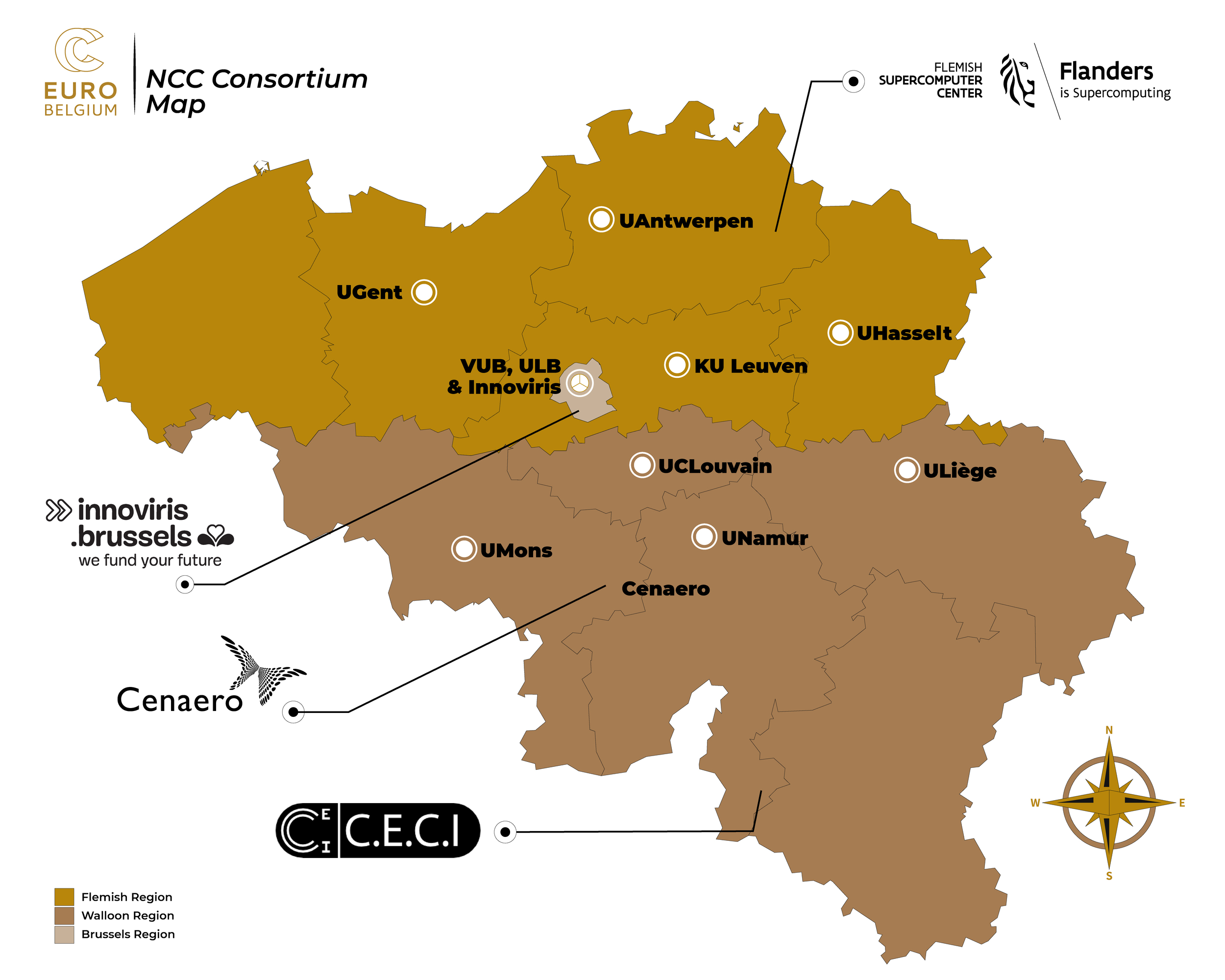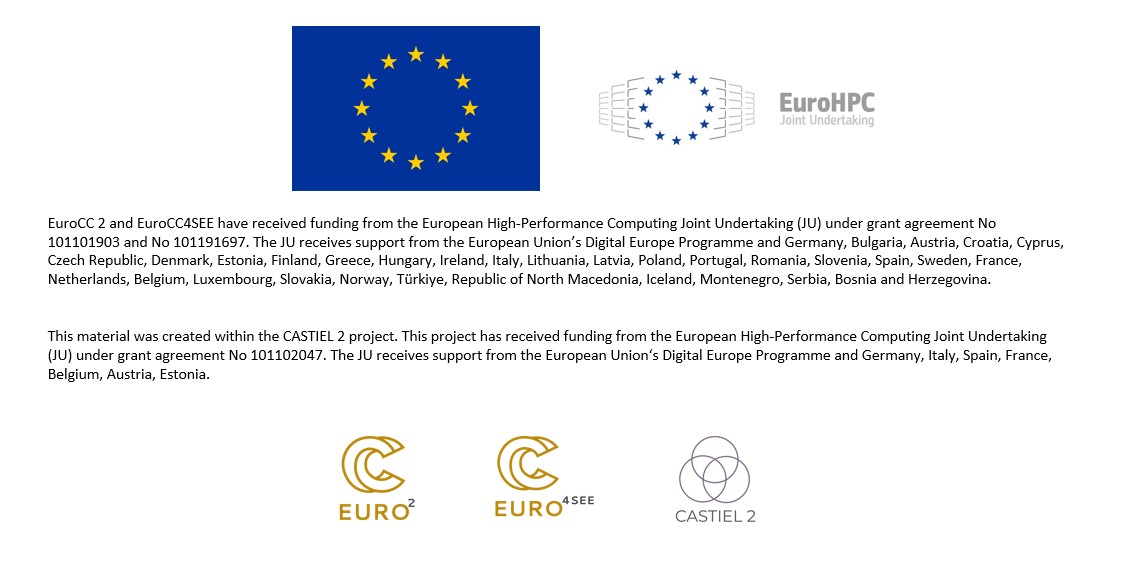
EuroCC Belgium - Empowering the Belgian supercomputing community
WHO ARE WE?
EuroCC Belgium is the National Competence Centre (NCC) in the area of high-performance computing (HPC) and high-performance data analytics (HPDA).
EuroCC Belgium coordinates activities in all HPC-related fields at a national level and serves as a reference contact point on HPC/HPDA/AI/Quantum Computing at a national level and for customers from industry, science, (future) HPC experts, and the general public alike.
Mission
The tasks of EuroCC Belgium are diverse, including (but not limited to):
Set up communication and dissemination actions
Offer a formal framework between HPC-related activities
Develop and display a comprehensive and transparent map of HPC competences and institutions
Act as a gateway for industry and academia to providers with suitable expertise or relevant projects, may that be national or international
Collect HPC training offers and display them on a central place together with international training offers collected by other NCC’s
Foster the industrial uptake of HPC
Facilitate access to systems, scientific and technical expertise and knowledge pools
EuroCC Belgium consortium and partners:

Do you want to receive information about HPC news, events and trainings? Contact us at contact [ati] enccb [dota] be (contact[at]enccb[dot]be) .
WHAT IS HIGH-PERFORMANCE COMPUTING?
High-performance computing (HPC) is typically defined as "using computing power that is vastly larger than available in a typical desktop computer".
Utilizing high-performance computing requires both the hardware, i.e., supercomputer, as well as software, i.e., the tools for programming HPC applications and using the supercomputer.*
*© by CSC – source Edukamu course. ‘Elements of Supercomputing’ https://edukamu.fi/elements-of-supercomputing
WHAT IS A SUPERCOMPUTER?
©PRACE: https://prace-ri.eu/
WHY DO WE NEED SUPERCOMPUTING?
Because a supercomputer operates remarkably faster than a conventional computer, supercomputing can help to solve extraordinarily
complex problems in science and industry. There are used in a multitude of application areas:
Health care/Drug development
User story of Manon Mirgaux (University of Namur): discover how HPC contributes to the design of new drugs in the treatment of cancer.
User story of Elly Mertens (ITG): Incorporating a lifetime approach in microsimulation modelling to curb the burden of lifestyle-related chronic diseases
Biology/Biotechnology
User story of Martin Grignard (University of Liège): learn how radio waves propagate in the head with Shamo
User story of Stefan Weckx (VUB): improving chocolate with supercomputing
Climate change/Weather forecasting
Environment
User story IRCEL: learn how the VSC HPC infrastructure is essential for the reporting of air quality for the whole of Belgium
User story VITO: learn how HPC infrastructure helped to provide the calculations for the high-resolution air quality modelling for the Environmental Impact Assessment Report in the context of the Oosterweelverbinding.
User Story Mats Denayer (VUB): Polymer recycling unveiled: Supercomputing and molecular dynamics paving the way to circular economy
Logistics
User story LOG Research Group UHasselt: supercomputing is used here to improve efficiency and productivity in a warehouse
Industry
User story Optimizing particle processes through simulation with MPacts
User story of Puxano: matchmaking, mapping industry challenges to research
User Story Atlas Copco: Understanding physics at the microscale in filter media with supercomputing
Space
User story Maarten Baes (UGent): supercomputing helps to better understand the universe by facilitating cosmological simulations
Engineering
User Story Prof. Kevin Van Geem (UGent): Design and optimization of a vortex unit for CO₂ capture based on computational fluid dynamics simulation
User Story Tractebel and Cenaero: The Role of High-Performance Computing in Ensuring Nuclear Reactor Safety
User Story Atlas Copco: Understanding physics at the microscale in filter media with supercomputing
User Story Alessio Pappa (UMons): Fuel and operational flexibility in micro Gas Turbine combustors for sustainable energy production
High-performance computing resources and knowledge are hugely important assets for any modern society providing a competitive advantage for research and industry.
*© by CSC – source Edukamu course. ‘Elements of Supercomputing’ https://edukamu.fi/elements-of-supercomputing
PROJECT EUROCC
The first part of the EuroCC project (Sept. 2020-Dec.2022), funded under the EuroHPC Joint Undertaking call in Horizon2020, aimed to bring the participating European countries to a common high level in the fields of supercomputing (HPC), high-performance data analytics (HPDA) and artificial intelligence (AI).
To this end, the project established national competence centres (NCC) in the participating countries.
For Belgium, the National Competence Centre is called EuroCC Belgium.
EuroCC works closely with the Coordination and Support Action (CSA) CASTIEL to link the national centres throughout Europe and to ensure successful collaboration between the participating countries.
Discover the EuroCC project and CASTIEL in this interview with project coordinator Bastian Koller.
EUROCC 2, EUROCC4SEE
Since February 2023, the EuroCC project has entered phase 2 and will further raise awareness about supercomputing HPC (focus on SMEs and industry) and grow/maintain the Belgian HPC Network through regular communication. The project strives to support supercomputing/HPDA/AI users by providing a clear overview of tools, training and services. We will also identify & fill the gaps in training and services.
The mission of EuroCC 2 and EuroCC4SEE is to continue the establishment of a network of National Centres of Competence (NCC) in the most efficient way while continuing to address the differences in the maturity of HPC deployment in Europe, for which improvement has already been noted. Therefore, in addition to high-level management to monitor progress in the NCCs’ development, the main task of the overall activity is to support national centres in setting up their individual operational frameworks while accessing and making the most of the experience and expertise currently available at the national and European levels. To support this, EuroCC 2 and EuroCC4SEE work together closely with CASTIEL 2, a Coordination and Support Action that is tailored towards the needs of the NCCs, as well as the Centres of Excellence.


